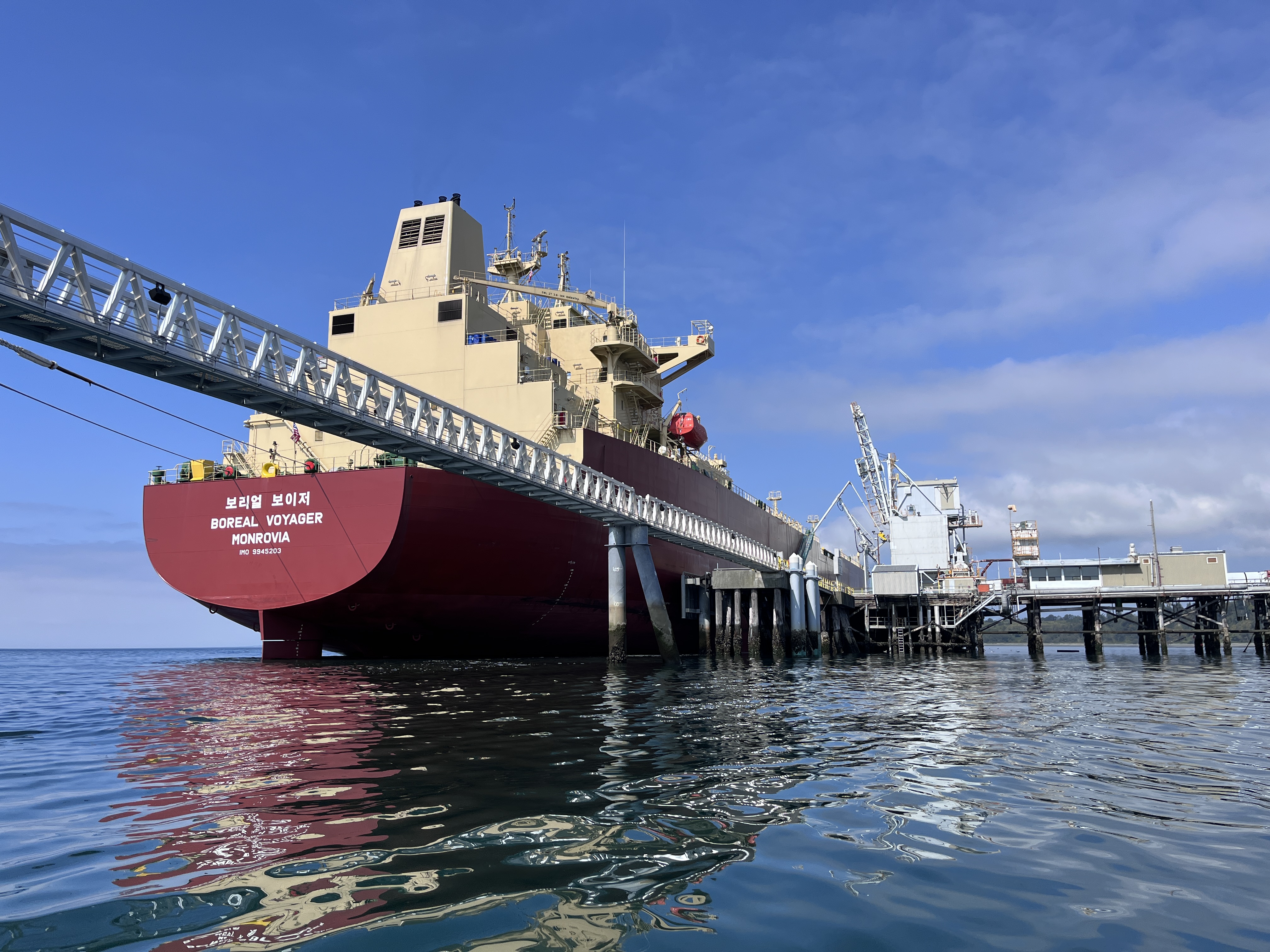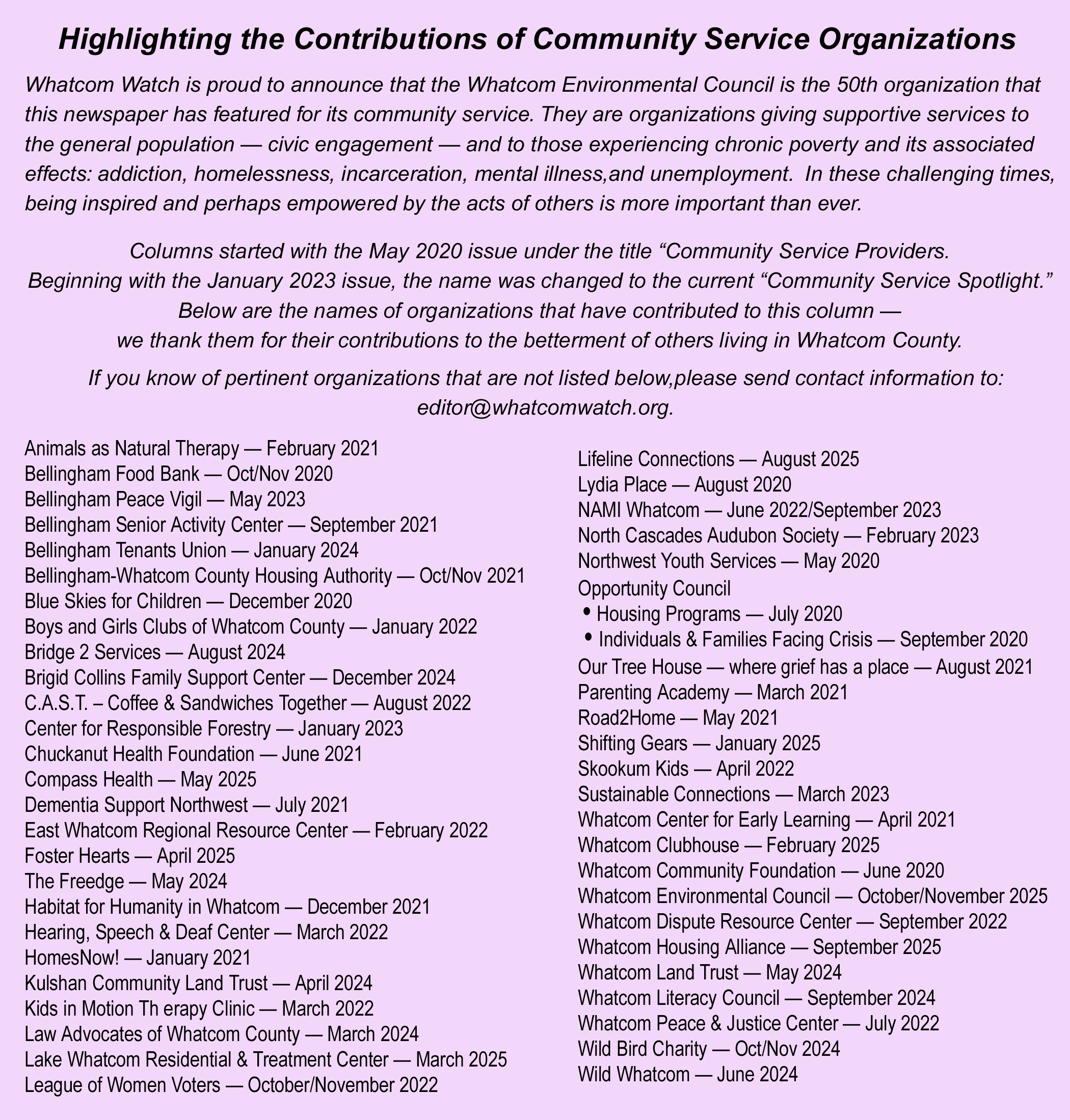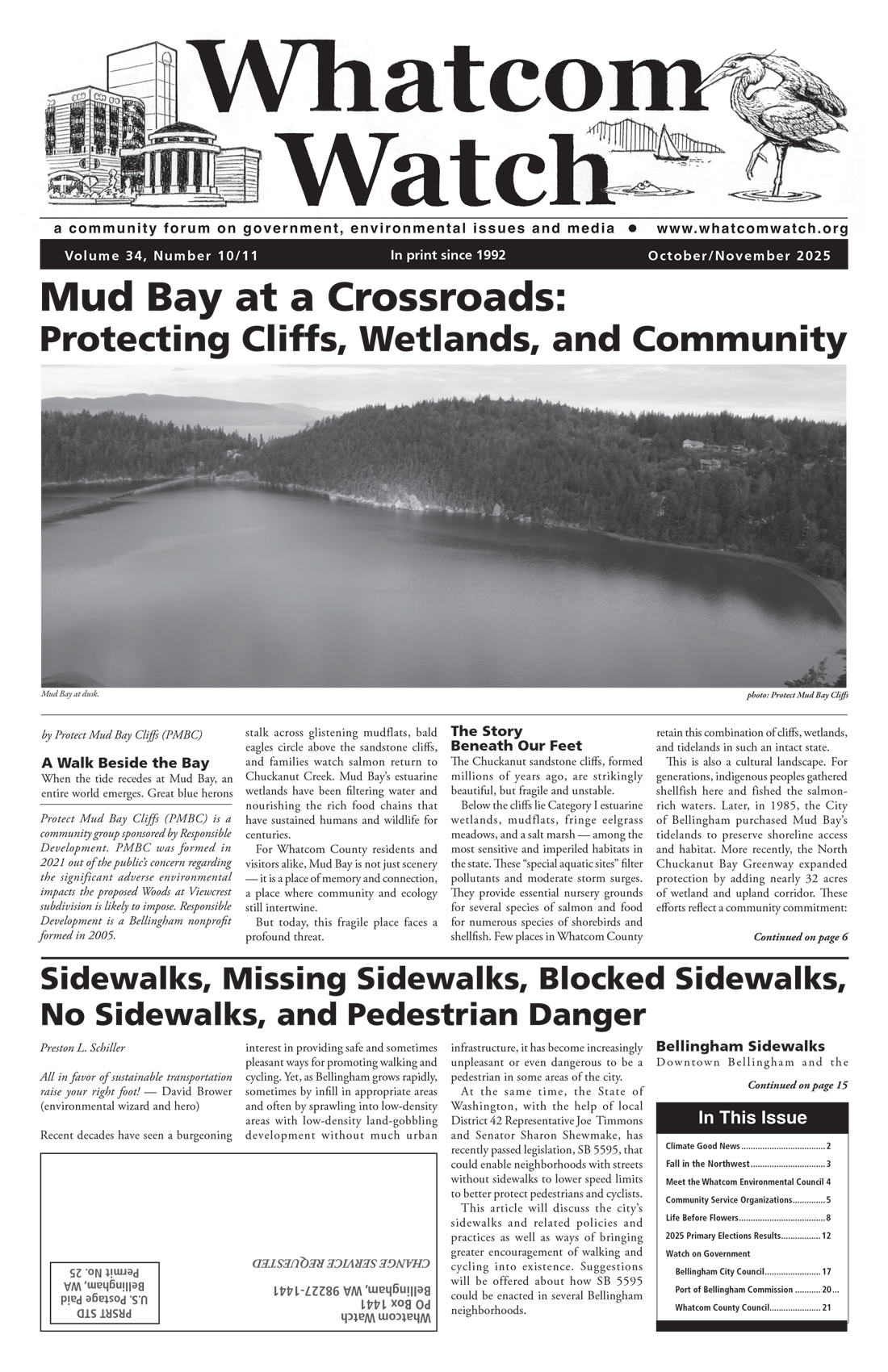Community Service Spotlight
Editor’s Note: For a brief period of time in the 1990s, there was an association called the Whatcom Environmental Council. There is no connection between the two.

by Carl Weimer
The Whatcom Environmental Council (WEC) is a relatively new local nonprofit that officially incorporated just a year ago. The WEC Board of Directors is currently composed entirely of retirees — individuals with decades of experience working on environmental issues from a wide range of roles and perspectives. Among us are former elected officials, government and tribal employees, attorneys, business people, and nonprofit leaders.
We came together because, while we enjoy the freedom retirement brings, we also recognize the value of our collective experience. It would be a shame not to share the knowledge we’ve gained to help our community continue making environmental progress. We may be retired, but we’re far from done — we still have hard-earned wisdom to offer.
New Adventure
Aging is a new adventure, one we’re still learning to navigate. Personally, the older I get, the faster time seems to pass. I’m increasingly aware that I may not have much time left to hike that skyline trail I’ve always meant to explore, paddle that wild river, travel abroad, reconnect with old friends, or leave things in good order for my kids. And yes, I still want to remind decision-makers that, too often, they prioritize short-term economics and human convenience over the broader well-being of all living things.
I also find myself walking into the garage to do something, only to forget what it was. While those memory lapses used to worry me, I’ve come to embrace them as a reminder that sometimes, another cup of coffee on the deck watching birds is more important than fixing a loose toilet seat or touching up house paint.
Getting older also gives us a unique perspective on change — something younger generations may not fully grasp. That perspective can be limiting if it leads to nostalgia or resistance to new ideas, but it can also be a powerful reminder of how far we’ve come.
We remember a time before computers, apps, and the internet when no one had a supercomputer in their pocket to answer most questions as fast as your thumbs can type. We remember when industry along our waterfront made Bellingham smell like rotten eggs or warm Wonder Bread, and some of the most toxic chemicals in the country were produced and used there and ended up in our local waters. We can remember a time when you could go to Cherry Point in the late spring and experience the water alive with spawning herring that attracted a cacophony of sea birds, roving seals and sea lions, porpoises, and Lummi fisherman.
That amazing perspective on change helps me to celebrate the apps on my smartphone that can identify plants or bird songs that with my hearing aids I can’t even hear. It also caused me to sit on a log at Cherry Point late this spring and weep since, for the past three years, no herring spawn has been detected there.
Born Over Beers
The idea for WEC was born over beers between Stan Snapp (former Bellingham City Council member) and me (a former County Council member), after we both left public office. We had previously worked together to create the Lake Whatcom Policy Group at a time when city and county councils were more focused on blaming each other for water quality issues than on solving them. Our hope with WEC was to use our experience and networks to help current leaders avoid wasting time reinventing the wheel and instead build on past efforts.
We were pleasantly surprised by how many others with similar backgrounds wanted to join us. In September 2024, we officially formed as a 501(c)(4) nonprofit — a designation that allows us to engage in direct policy advocacy and even endorse candidates if we choose.
In our first year, WEC has focused on providing guidance on local decisions that impact the environment. As a volunteer-run organization, we’ve had to be strategic about where we invest our time and energy. We prioritize issues where our expertise can make a difference and where others aren’t already deeply involved.
Here are a few things we’ve done in our first year:
- Weekly Agenda Reviews: Each week we review the agendas for the upcoming meetings of all the city councils in the county, as well as the County Council, the PUD, the Port of Bellingham, the Northwest Clean Air Agency, and the Conservation District, to see if there are topics on those agendas we should weigh in on. We also review major development permits and land use changes, and the release of a variety of plans and proposals. (We could use some more volunteers to help do these weekly reviews. If interested, send an email to whatcomec@gmail.com.)
- Lake Whatcom Advocacy: We weighed in with the Bellingham City Council about how inappropriate it is to try to increase housing in the Lake Whatcom Watershed, even in the face of an affordable housing crisis.
- Outreach and Education: We created a website (https://www.whatcomenvirocouncil.org/), Facebook page (https://www.facebook.com/profile.php?id=61564044226611) and started publishing a monthly newsletter to help educate and keep people informed of our efforts. You can sign up to receive the newsletter directly on our website, and all of our comment letters and past newsletters are posted on the website.
- Advocacy on Population Growth: We pointed out to all the cities and the county that, as part of their Comprehensive Plan updates, they are choosing higher population numbers than are needed by all the best forecasts, and that such growth-oriented choices can lead to unnecessary sprawl, loss of farm and forest lands, and higher infrastructure costs for their existing taxpayers.
- Comprehensive Plan Comments: We advocated with all the cities and Whatcom County to follow the new Growth Management Act requirements to develop strong climate actions, include ways to reduce the use of motor vehicle trips, and protect the urban tree canopy and create community forests. We also pointed out that there is supposed to be separation between cities, and that it is often possible to use these required separations for beneficial open space and wildlife corridors.
- Samish Crest Forum: We held a public forum to educate neighboring residents about the potential land use changes outlined in the draft Comprehensive Planning documents from the city and county that could affect the Samish Crest area and the water quality in Lake Padden.
- Incinerators and Sewage Sludge: We are continuing to work with a coalition of local people and groups on needed changes to Bellingham’s handling of its sewage sludge to ensure it is being dealt with environmentally responsibly and in a way that doesn’t burden citizens with hundreds of millions of dollars on cost.
- Cherry Point Coalition: We have been an active member of a coalition of environmental groups from Whatcom, Skagit and San Juan counties reviewing the permitting requirements for proposed changes to the AltaGas LPG export facility at Cherry Point to ensure such changes do not expand greenhouse gas emissions, or that the huge increase in train and ship traffic does not negatively impact the human and natural environment, including efforts to protect orca whales. The county is currently trying to approve all of these permits without any comprehensive environmental impact statement, and we stand ready to challenge that decision if the county does not change the determination.

photo: David Stalheim
A liquefied petroleum gas tanker being loaded at Cherry Point.
While it’s been rewarding to stay engaged, running an organization and responding to so many issues is a lot of work. It sometimes conflicts with our retirement dreams of travel, recreation, and relaxation. Clearly, we’ve tapped into a real community need. More and more people and organizations are reaching out for help.
This growing demand has put pressure on our WEC Board of Directors. To help manage the load, we recently hired a very part-time administrative assistant. Still, we constantly remind ourselves that we can’t do it all. If we want to be able to expand our impact and respond to more requests for assistance, we need more board members and volunteers — and a way to coordinate them effectively while maintaining the high standards we’ve set for engaging with local governments.
Our ability to do more, while maintaining the volunteer-driven stature of the organization, may be our biggest challenge in the near future. If you’re interested in volunteering or joining the board, please reach out. We’d love to hear from you.
____________________________________
Carl Weimer is the president of the Whatcom Environmental Council, and also the Special Projects Advisory for the Pipeline Safety Trust. Previously he spent 12 years on the Whatcom County Council, and also served as the executive director of both the Pipeline Safety Trust, and before that RE Sources.






























